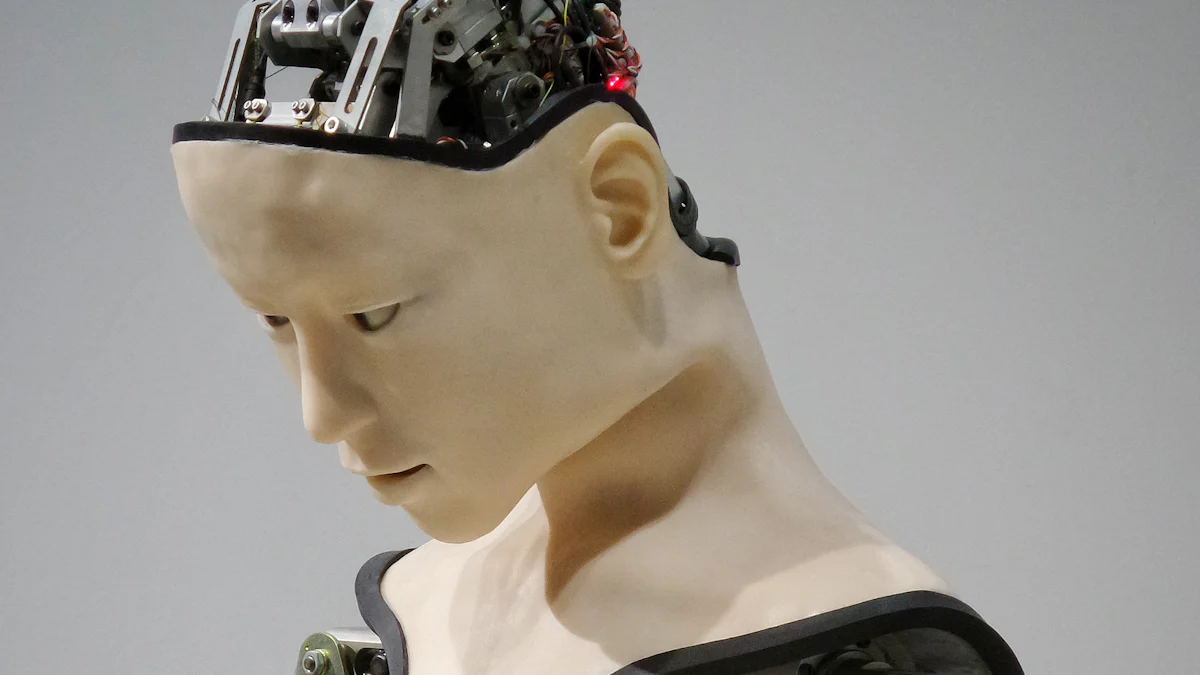Major Players in the Neuromorphic Computing Market

The neuromorphic computing market features several leading companies that drive innovation and technological advancement. Intel Corporation stands out with its pioneering work in digital neuromorphic systems, particularly through its Loihi chips. IBM has made significant strides with its brain-inspired architectures, while Qualcomm Technologies, Inc. contributes to the development of energy-efficient devices. These companies, along with others like Samsung Electronics Co., Ltd., play a crucial role in shaping the future of AI Neuromorphic Computing, pushing the boundaries of what's possible in this rapidly evolving field.
Established Leaders in Neuromorphic Computing

Intel Corporation
Contributions and Innovations
Intel Corporation, a pioneer in semiconductor technology, has significantly advanced AI Neuromorphic Computing. The company has focused on creating energy-efficient digital neuromorphic systems. Intel's Loihi chips exemplify this innovation, offering a platform that mimics the human brain's neural networks. These chips enable faster processing with lower power consumption, making them ideal for AI applications.
Key Products and Technologies
Intel's Loihi chips stand out as a key product in their neuromorphic portfolio. These chips incorporate advanced learning capabilities, allowing them to adapt and improve over time. Intel's commitment to research and development ensures continuous innovation in AI Neuromorphic Computing, maintaining its leadership position in the market.
IBM
Contributions and Innovations
IBM has been at the forefront of neuromorphic computing with its groundbreaking TrueNorth chip. This chip represents a significant leap in brain-inspired architectures, designed to process information in a manner similar to the human brain. IBM's innovations have paved the way for more efficient and scalable AI solutions.
Key Products and Technologies
The TrueNorth chip is IBM's flagship product in neuromorphic computing. It features a network of one million programmable neurons, enabling complex computations with minimal energy use. IBM's focus on developing scalable and efficient AI Neuromorphic Computing solutions continues to drive advancements in the field.
Qualcomm Technologies, Inc.
Contributions and Innovations
Qualcomm Technologies has made substantial contributions to the development of neuromorphic computing. The company leverages its expertise in wireless communication to explore new applications for AI Neuromorphic Computing. Qualcomm's innovations aim to enhance the efficiency and performance of AI systems.
Key Products and Technologies
Qualcomm's neuromorphic technologies focus on integrating AI capabilities into mobile and IoT devices. By optimizing energy efficiency and processing power, Qualcomm ensures that its products meet the demands of modern AI applications. Their ongoing research and development efforts promise further breakthroughs in AI Neuromorphic Computing.
Samsung Electronics Co. Ltd
Contributions and Innovations
Samsung Electronics Co. Ltd, a global leader in technology, has made significant strides in the field of neuromorphic computing. The company focuses on developing cutting-edge technologies that mimic the human brain's neural networks. Samsung's commitment to innovation has led to the creation of advanced neuromorphic chips that enhance the efficiency and performance of AI systems. By leveraging its expertise in semiconductor manufacturing, Samsung continues to push the boundaries of AI Neuromorphic Computing, contributing to the industry's growth and evolution.
Key Products and Technologies
Samsung's neuromorphic portfolio includes a range of innovative products designed to meet the demands of modern AI applications. The company's neuromorphic chips are engineered to deliver high performance with low power consumption, making them ideal for a variety of applications, from mobile devices to large-scale data centers. Samsung's ongoing research and development efforts ensure that its products remain at the forefront of technological advancement, providing customers with reliable and efficient solutions.
Emerging Startups and Innovators
BrainChip Holdings
Contributions and Innovations
BrainChip Holdings has emerged as a significant player in the AI Neuromorphic Computing landscape. They focus on developing advanced AI solutions that mimic the human brain's functionality. Their innovations aim to enhance the efficiency and speed of data processing, making AI applications more accessible and effective.
Key Products and Technologies
BrainChip's flagship product, Akida, stands out in their portfolio. This neuromorphic processor offers real-time learning capabilities, enabling devices to process information quickly and efficiently. Akida's design supports a wide range of applications, from smart home devices to autonomous vehicles, showcasing BrainChip's commitment to pushing the boundaries of AI Neuromorphic Computing.
SynSense
Contributions and Innovations
SynSense, a Swiss-based startup, has made remarkable strides in neuromorphic computing. They focus on creating ultra-low-power chips that replicate the brain's neural networks. SynSense's innovations contribute to the development of energy-efficient AI systems, which are crucial for portable and wearable technology.
Key Products and Technologies
The Dynap-CNN chip is a notable product from SynSense. It integrates convolutional neural networks with neuromorphic principles, offering high performance with minimal energy consumption. This technology is ideal for applications in robotics and IoT devices, where power efficiency is paramount.
GrAI Matter Labs
Contributions and Innovations
GrAI Matter Labs has positioned itself as a leader in the neuromorphic computing sector by developing processors that emulate the brain's cognitive functions. Their work focuses on improving the speed and efficiency of AI systems, making them more adaptable to real-world scenarios.
Key Products and Technologies
GrAI Matter Labs' GrAI One processor exemplifies their innovative approach. This processor is designed to handle complex AI tasks with low latency, making it suitable for applications in robotics and autonomous systems. GrAI One's architecture allows for seamless integration into existing AI frameworks, enhancing the overall performance of AI Neuromorphic Computing solutions.
Artificial Learning Ltd
Contributions and Innovations
Artificial Learning Ltd has emerged as a dynamic force in the AI Neuromorphic Computing landscape. The company focuses on developing cutting-edge solutions that emulate the brain's neural processes. Their innovations aim to enhance the adaptability and efficiency of AI systems, making them more responsive to real-world applications. By leveraging advanced algorithms and machine learning techniques, Artificial Learning Ltd contributes significantly to the evolution of neuromorphic technology.
Key Products and Technologies
Artificial Learning Ltd offers a range of products designed to meet the demands of modern AI applications. Their flagship product, NeuroSim, stands out for its ability to simulate complex neural networks with high precision. This technology supports various applications, from autonomous vehicles to smart home devices, showcasing the company's commitment to advancing AI Neuromorphic Computing. Artificial Learning Ltd's ongoing research and development efforts ensure that their products remain at the forefront of technological innovation.
Innatera Nanosystems
Contributions and Innovations
Innatera Nanosystems has positioned itself as a leader in the neuromorphic computing sector by focusing on the development of ultra-low-power chips. These chips replicate the brain's neural networks, offering energy-efficient solutions for AI applications. Innatera's innovations contribute to the creation of portable and wearable technology, which is crucial for the future of AI Neuromorphic Computing.
Key Products and Technologies
The NeuroEdge chip is a notable product from Innatera Nanosystems. It integrates neuromorphic principles with advanced processing capabilities, providing high performance with minimal energy consumption. This technology is ideal for applications in robotics and IoT devices, where power efficiency is paramount. Innatera's commitment to research and development ensures that their products continue to push the boundaries of AI Neuromorphic Computing.
Emerging Trends and Technologies in AI Neuromorphic Computing

Advancements in Neuromorphic Hardware
New Developments
The field of neuromorphic hardware is witnessing remarkable advancements. Companies like GrAI Matter Labs are at the forefront, developing programmable neuromorphic chips that bring sensor analytics and machine learning to edge devices. These chips utilize brain-inspired neural network architecture, overcoming the limitations of traditional processors. This innovation allows for multi-modal sensor analytics and machine learning at low power levels, making it ideal for portable and wearable technology.
BrainChip is another key player, focusing on edge AI on-chip processing. Their neuromorphic processors emphasize energy efficiency and privacy, integrating seamlessly into sectors such as automotive and consumer electronics. These developments highlight a shift towards more efficient and adaptable AI Neuromorphic Computing solutions.
Market Impact
The impact of these advancements on the market is profound. The demand for energy-efficient and high-performance AI systems is driving the growth of neuromorphic hardware. Companies are increasingly adopting these technologies to enhance their products' capabilities. This trend is particularly evident in industries like automotive, where real-time data processing is crucial. The integration of neuromorphic chips into various applications is expected to revolutionize the way devices interact with their environment, offering faster and more efficient solutions.
Software and Algorithm Innovations
New Developments
Software and algorithm innovations are equally pivotal in the evolution of AI Neuromorphic Computing. SynSense, for instance, offers mixed-signal neuromorphic processors that excel in smart vision and auditory processing. Their technology supports multi-modal signal processing, enhancing the adaptability of AI systems to real-world scenarios.
These innovations are not limited to hardware alone. Advanced algorithms are being developed to optimize the performance of neuromorphic systems. These algorithms enable devices to learn and adapt in real-time, improving their efficiency and responsiveness. The focus is on creating software that complements the capabilities of neuromorphic hardware, ensuring seamless integration and operation.
Market Impact
The market impact of these software and algorithm innovations is significant. They enable companies to develop AI systems that are not only efficient but also highly adaptable. This adaptability is crucial in sectors like robotics and IoT, where devices must respond to dynamic environments. The integration of advanced algorithms into neuromorphic systems enhances their performance, making them more attractive to businesses seeking cutting-edge solutions.
The supportive role of Zhongkai High-tech Zone National Foreign Trade Transformation and Upgrading Base (Electronic Information) Cloud Platform cannot be overlooked. This platform fosters enterprise growth by providing resources and support for companies developing neuromorphic technologies. Its assistance is instrumental in driving innovation and ensuring that enterprises in the region remain competitive in the global market.
The neuromorphic computing market thrives on the innovations of major companies like Intel, IBM, and BrainChip Holdings. Their contributions have propelled AI Neuromorphic Computing into new realms of efficiency and capability. Future developments promise even greater integration of these technologies into everyday applications, enhancing both performance and energy efficiency. The Zhongkai High-tech Zone National Foreign Trade Transformation and Upgrading Base (Electronic Information) Cloud Platform plays a pivotal role in this growth. By providing resources and support, it fosters enterprise development, ensuring that companies in the region remain competitive and innovative.
See Also
Leading Figures in the Worldwide Intelligent Control Sector
Transforming Semiconductor Displays: Zhongkai's Major Investments Unveiled
Unveiling the Technology Titans of Huizhou Zhongkai
Zhongkai High tech Zone National foreign trade transformation and Upgradi Base(Electronic Information)Cloud Platform.
Address: Zhongkai High-tech Zone,Huizhou City ,Guangdong,China
E-mail: huizhoueii@163.com 13510001271@163.com
Tel: +86-0752-3279220 Mobile: +86-13510001271


